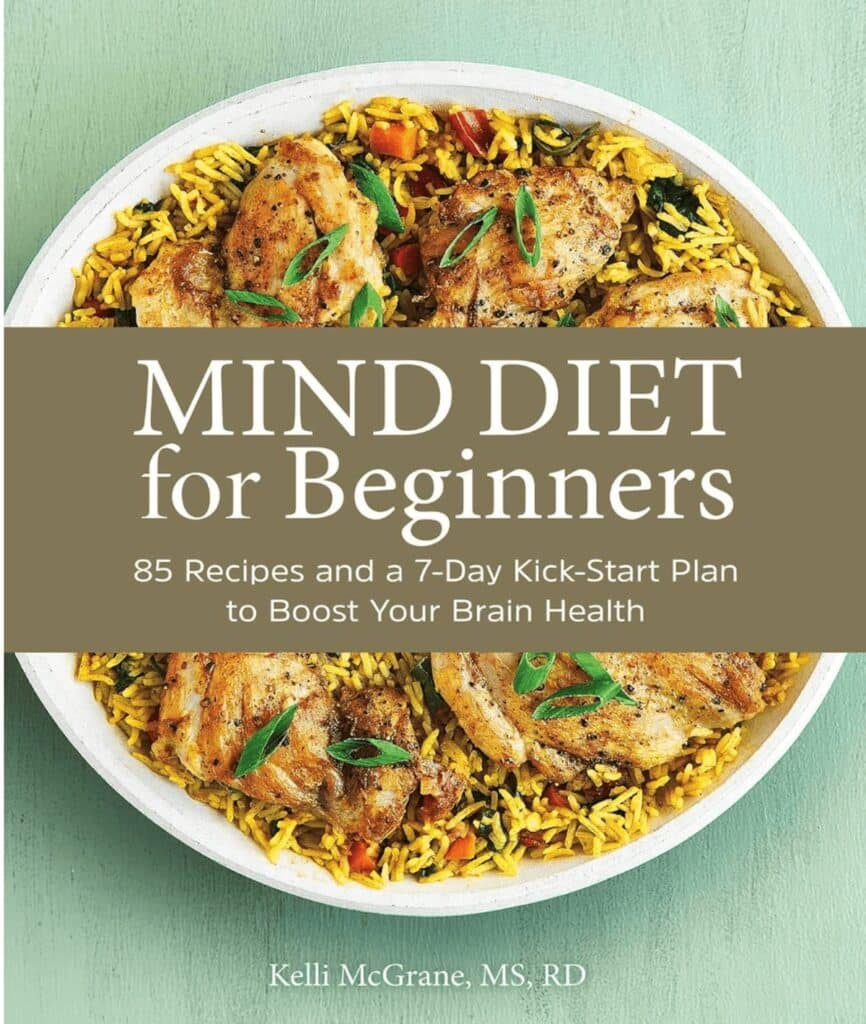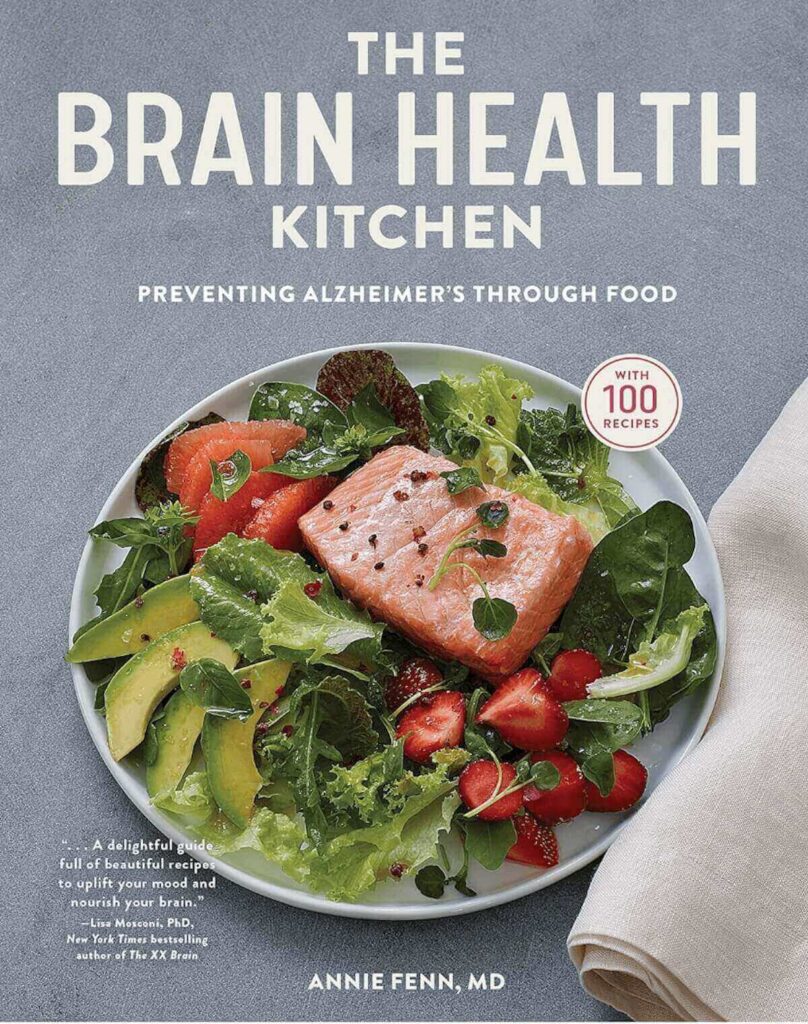This article is all about the MIND diet pros and cons.
The MIND diet was developed in 2015 for brain health. But as you will read it is a combination of heart healthy Mediterranean diet and DASH diets.
Top Takeaways
- The MIND Diet combines elements of the DASH Diet and the Mediterranean Diet, with a specific focus on brain health and neurocognitive protection.
- Research indicates that the MIND Diet can slow cognitive decline in older adults, reduce the risk of dementia and Alzheimer’s disease, and strengthen brain health by emphasizing foods rich in antioxidants, anti-inflammatory properties, and neuroprotective factors.
- Foods to include in the MIND Diet are green leafy vegetables, berries, whole grains, nuts, beans, poultry, white meats, fish, and low-saturated and unsaturated fats. Foods to avoid include red and processed meats, high-saturated fats, certain dairy products, and sweets.
- The MIND Diet offers benefits for brain health, cardiovascular health, and weight management, but it can be more rigid in its food recommendations compared to the DASH and Mediterranean diets, making meal planning more structured and focused on improving neurocognitive function.
*Please note that this post contains clearly identified affiliate links. If you click on these links and choose to make a purchase, I may receive a commission (at no cost to you). As an Amazon Associate, I earn from qualifying purchases.
MIND Diet
The MIND Diet is a unique hybrid between the DASH Diet and the Mediterranean Diet.
MIND stands for Mediterranean-DASH Intervention for Neurodegenerative Delay.
The MIND Diet uniquely emphasizes the principles of both the DASH Diet and Mediterranean Diet in its food plans and nutritional content.
However, the MIND Diet specifically puts more emphasis on strengthening brain health.
Research
The MIND Diet was specifically formulated and researched for the goal of reducing neurocognitive health deterioration. It has been shown through numerous studies to successfully do this.
It has been found that the MIND Diet can slow cognitive decline in older adults. It can also reduce the risk of developing dementia and Alzheimer’s disease (1).
The MIND Diet emphasizes the consumption of certain foods that have high levels of antioxidative, anti-inflammatory, and neuroprotective activities such as green leafy vegetables and berries.
Green leafy vegetables for example are rich in certain nutrients that contribute to better cognitive function and protect the neurons from oxidative stress (1).
Berries have also been shown to increase brain cell growth and protect the cognitive system from neurodegeneration and oxidative stress (1).
The MIND Diet can significantly help improve and protect neurocognitive health from deterioration and decline, particularly in older individuals.
Foods To Include
The MIND Diet builds onto the food plans provided by the DASH Diet and Mediterranean Diet. However, certain foods are more strongly emphasized and include:
- Vegetables – specifically green leafy vegetables
- Berries
- Whole grains
- Nuts and beans
- Poultry and white meats
- Fish
- Low-saturated and unsaturated fats
Foods To Avoid
Certain foods to avoid when following the MIND Diet include:
- Red and processed meats
- High-saturated fats
- Certain dairy products such as butter, cheese, and margarine
- Sweets
Health Benefits
The MIND Diet like the DASH Diet and Mediterranean Diet can provide numerous health benefits.
Though there is a greater emphasis on brain health, the MIND Diet can bring many other health-related benefits due to its specific emphasis on green leafy vegetables, berries, and many other healthy nutrient-rich foods.
However, with its more limited fruit and vegetable content, it is recommended to supplement the MIND Diet with other food plans that emphasize greater fruit and vegetable consumption to see more health benefits.
Brain Health
The MIND Diet has been extensively studied to have the ability to improve and strengthen brain health due to its nutritional content.
Because it is specifically high in green leafy vegetables and berries, which are all known to improve brain function and cognitive activity, the MIND Diet has been found to slow cognitive decline and reduce the risk of developing various neurodegenerative diseases (1).
Certain foods such as leafy green vegetables and berries have high levels of antioxidative, anti-inflammatory, and neuroprotective activities.
These foods can
- improve and strengthen cognitive function
- stimulate brain cell growth
- protect neurons and cells from oxidative stress
- reduce the overall risk of neurodegeneration (1).
Cardiovascular Health
The MIND Diet can improve cardiovascular health and reduce the risk of developing heart-related diseases due to its high content of whole grains and leafy green vegetables (2).
These foods can have protective nutritional properties which can prevent oxidative stress and strain on the body’s cells. By doing so, cardiovascular disease risk can be decreased.
In addition, the MIND Diet has been found to reduce levels of cholesterol in the blood, which can further decrease cardiovascular disease development risk (3).
Weight Management
With the MIND Diet, there is greater consumption of green produce and healthy proteins, which can reduce overall caloric intake.
As a result, weight management can be significantly easier with dietary plans such as the MIND Diet. This is because it reduces the intake of foods that can cause weight gain. This reduced caloric intake would result in better weight management.
The MIND Diet is more directed towards helping improve cognitive health with the consumption of certain foods. As a result, this diet sees more limitations on the benefits foods such as other fruits and vegetables can provide.
Mind Diet Pros and Cons
While the MIND Diet was developed from both the Mediterranean and DASH Diet, there are a few key differences that distinguish the MIND Diet as its own unique food plan.
All three diets emphasize the consumption of fruits and vegetables, healthy fats and meats, fish, and whole grains.
However, the differences with the MIND Diet include:
- more specific fruits to consume. It generally limits this category to certain types such as berries.
- vegetables such as spinach and kale.
- limiting cheese and butter rather than a general guideline of moderating all dairy consumption.
- emphasis on eliminating all foods that are known to have unhealthy effects on the brain. These foods include red and processed meats, high-saturated foods and fats, and sweets.
Generally, the structure of the MIND Diet is more rigid in the foods recommended than the DASH or Mediterranean diets. Although it has strong research which suggests it can decrease the risk of neurodegeneration and improve overall brain health.
As a result, food planning can be more limited with the MIND Diet and its health benefits are more catered towards the idea of improving neurocognitive function.

MIND Diet Books
MIND Diet Recipe
Final Thoughts
In summary, here are the MIND diet pros and cons. Although the MIND diet has promising research for our health, it is very rigid and may take a lot of planning and organizing to include specific foods like berries, spinach, kale and nuts into your daily eating pattern.
Additionally, there is a list of foods to avoid like cheese and sweets which reduces its flexibility and may be less sustainable than the Mediterranean dietary pattern.
That being said, if you like a rigid plan and are motivated to eat for brain health reduced inflammation, and heart health, this diet is for you!
This article was written by Cindy Nguyen, Nutrition Student, and medically reviewed by Veronica Rouse, MAN, RD, CDE.







